It was a telltale “neck-hair moment” when I met Kisha Johnson at a celebration of Feeding Southwest Virginia, our region’s food bank, two years ago. She was there representing God’s Storehouse, a Galax, Virginia, soup kitchen that purchases discounted commodities and produce from Feeding Southwest.
But it was clear from our five-minute chat that Kisha and her parents, Bill and Delina Parks, give their community much more than food. I could tell that from the hairs standing up on the back of my neck.
When I’m leading a writing workshop, I tell students to look for stories that move them. These are stories that, combined with solid reporting and due diligence, readers best connect with because they give them the feeling of being there. The great Maya Angelou nodded to this when she told her students to “write it so that people hear it, and it slides through the brain and goes straight to the heart.”
My neck-hair moment with Kisha was a story about her mom, Delina Parks (though most people call her by her grandma name, “Nene”). Nene, 66, is the force behind the nonprofit soup kitchen’s becoming a place that not only offers suppers most nights but also turned into a beacon for folks in active addiction and recovery in Galax, which has the fifth highest rate of nonfatal overdoses in the nation.
Three years ago, when Mandi Black was living in a Galax trap house in the foothills of the Blue Ridge mountains with no electricity or running water and only her fellow drugs users to turn to, she came to the Galax food pantry so skinny and hyped-up on meth that she couldn’t even hold a utensil.
“What would Jesus do?” Nene asked herself. Then she sat down next to her, picked up a spoon, and fed her with it. So it went, night after night, until eventually Mandi, who’d been a registered nurse before losing everything—including her job, custody of her kids, and her house—could pick up the spoon by herself.
“In the beginning, Nene would give us chocolate cakes, cookies, so many desserts—anything just to get us to eat,” said Mandi, who’s been sober for five years. “We’d leave the soup kitchen and walk back to the trap house carrying seven or eight pizzas at a time. That’s just how she shows love.”
It’s how the whole family does. They understand, first and foremost, that love is what builds trust among addicted people who can’t access food, let alone connections to evidence-based care. Kisha has scoured trap houses to feed people and build connections to care after decades of trauma and addiction. She’s delivered clean needles so users wouldn’t contract HIV and Hepatitis C, raised money to install showers and laundry facilities for people who don’t have running water, helped the addicted access lifesaving medication-assisted treatments.
She brooks no shortcuts, including among holier-than-thou folks who can’t see addicted people as anything but moral failures. She has kicked out occasional volunteers who were rude when people showed up high, or when a hungry boy asked for a third hot dog—telling them, “There are six doors in this building, and you can walk out of any one of them.”
Republicans in Congress are banking on cutting $300 billion from the food stamp program called SNAP, part of its cataclysmic strategy to make America’s rich richer by extending Trump’s tax cuts on the backs of poor people. You know they know how shameful they’re being—the 30 percent SNAP cut would be the biggest in history—when they schedule their committee meetings in the middle of the night. Their “big, beautiful bill” would also leave an estimated 10 million Americans without Medicaid health coverage, including some members of my family.
In my Ohio hometown of Urbana, the setting for my forthcoming book, Paper Girl, the Trump Administration’s elimination of the $900 million Local Food Purchase Assistance program is not only gutting local food pantries; it’s hurting local farmers, too. This, at a time when the cost of preparing meals has more than doubled in five years and when childhood food insecurity is at rates matching those of the Great Recession.
I drove to Galax last week to see how the thousand federal cuts wending their way through Congress were playing out on the ground in places like Galax, a small city hammered first by globalization, then the opioid crisis, and the setting of my first book, “Factory Man.” In a place where 72 percent of voters pulled the lever for Trump in 2024, Kisha has become an outspoken critic of people who call themselves Christians but are more interested in protecting their own pocketbooks than their neighbors. “I think they would have crucified Jesus!” she said.
What I found was a story not so much about cuts or even food insecurity but a story about forgiveness, community-building, and how to show love—one spoonful, one plate, and one banana box full of food at a time.
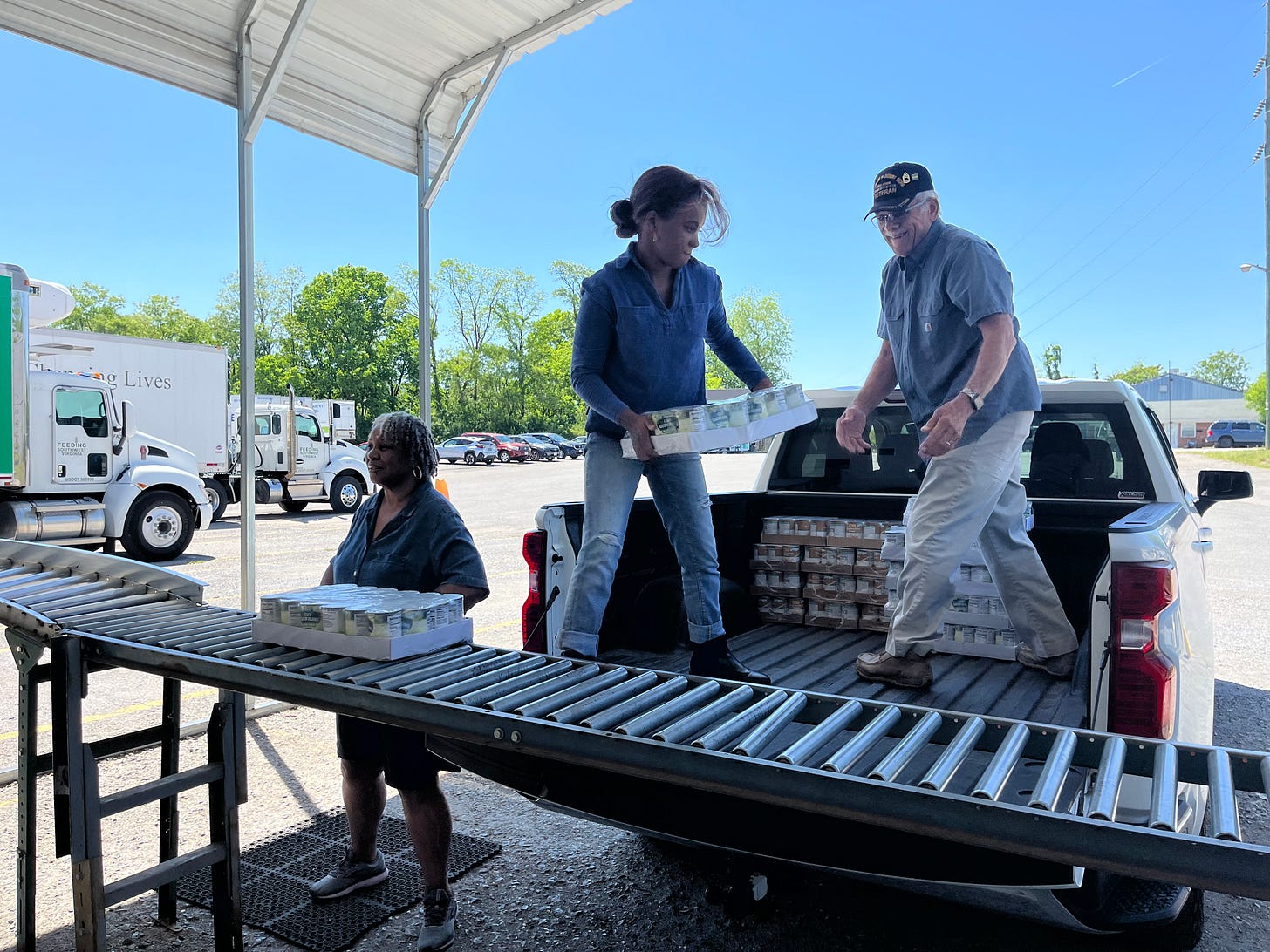
God’s Storehouse operates out of a renovated 10,000-square-foot building that used to be a Piggly Wiggly grocery along the edge of downtown. It’s paid for with donations, federal and city-directed grants, as well as Covid-era and opioid litigation money for a combined $2.7 million dollars over three years.
But to really understand a place so unusual that the chief of police regularly dines with former trap-house operators, where adults learn how to read, and where kids born to drug users are tutored by therapists and teachers, you have to start at the most notorious trap house in the foothills of the Blue Ridge mountains. It was the same shack where Kisha picked up 104-pound Mandi in the middle of the night and delivered her to treatment five years ago.
We got there after a hard rain: puddles blanketed the hillside and Virginia creeper crept its way up the side of the house, with its broken windows, a rusty tin roof, and trash piled on all sides. We were looking for John, its current occupant, but no one answered the door.
Our tour guide was Misty Urbina, who used to live there with Mandi, a man named Joe who ran the place, and other drug users, some of whom were being sex trafficked. An extension cord connected to a nearby home powers a lamp and a heater. The kitchen sink, full of moldy dishes, hasn’t been used in years.
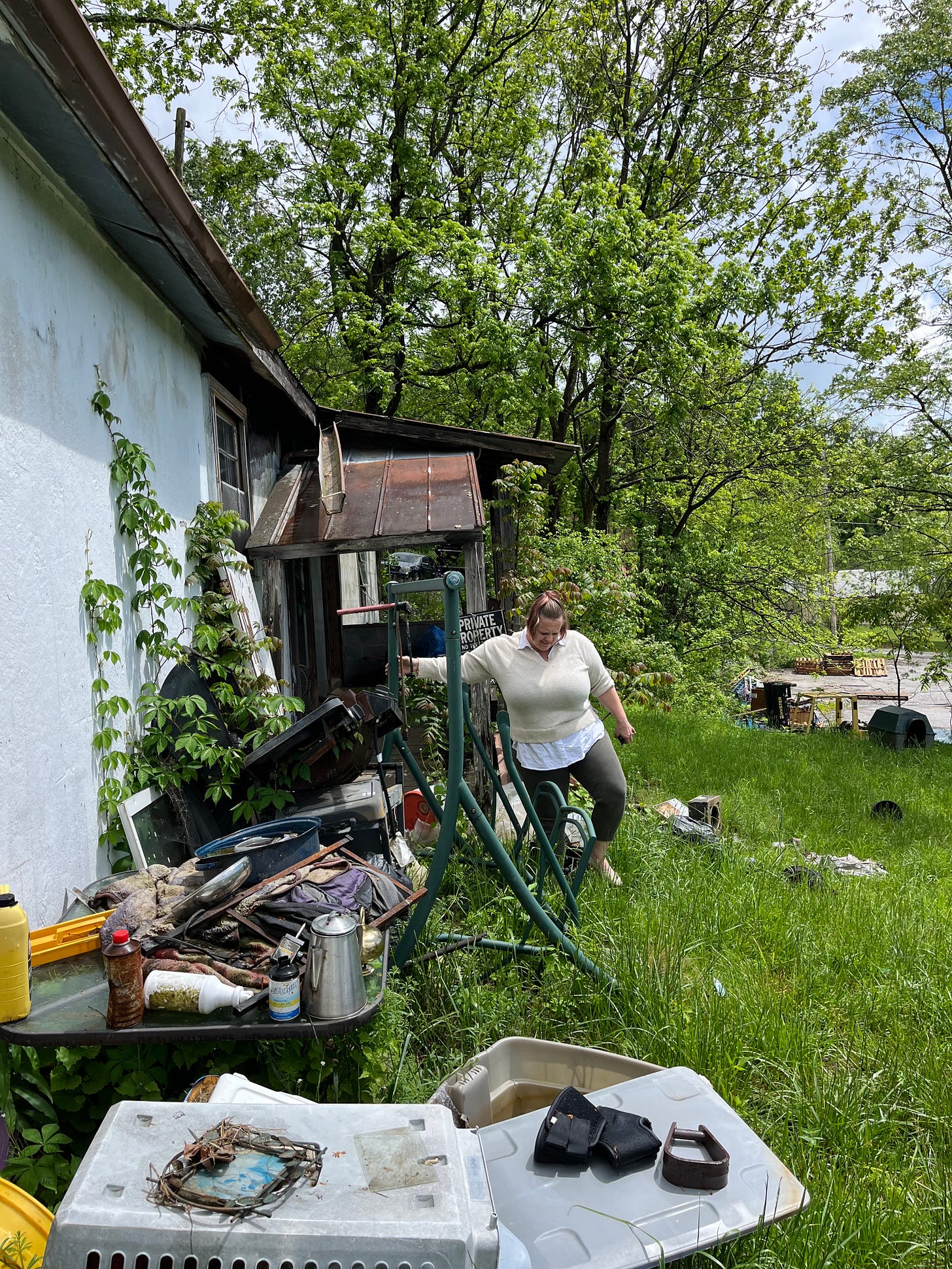
Misty recalled living here during her two years of homelessness. “I used to work this whole area at 2 and 3 in the morning delivering dope,” she told me. Her younger brother would sometimes find her sitting outside the shack cross-legged, stacking stones and talking to fairies. In the winter, Misty and Joe would walk the streets of Galax all night long just to keep warm.
It was here at the Railroad Avenue trap house that it occurred to Kisha that you couldn’t just open the doors of a soup kitchen and expect that the neediest people would miraculously come and find you. Her calling, as she now saw it, was to go out in the community and get the people who most needed help to come in from the chaos and the cold.
The food would be the initial carrot. But the non-judgment and love were what kept folks coming back.
When God’s Storehouse began targeting people in active addiction, starting with Thursday night Celebrate Recovery meals and meetings, it was Joe’s trap house where Kisha first went for recruits. She now has 158 participants with two years or more of sobriety; roughly half have reunified with their children.
When someone returns to drug use—it’s estimated that 92 percent of meth users will relapse—Kisha and her mom and 75-year-old dad find them and bring them back. First, they put them in a circle and tell the person what they love about them. Then, Nene bends down to literally dust off the person’s knees, ceremonially readying them for their new start.
“The idea is to undo the shame,” Kisha says. “If you’re wrapped up in shame, you won’t come back.”
They’ve learned to celebrate the tiny victories, like the fact that John hasn’t been to jail in a while, though he still drinks several beers a day before showing up for the soup kitchen suppers. Or the fact that Vicki really, really wanted to buy alcohol the other day but decided instead to buy flowers to take to her daughter’s grave. The ABC store and Grayson Florist are next door to each other, Vicki explained, and Kisha high-fived her and said, “Girl, I’m so proud of you!”
Police chief DeWitt Cooper, a board member of God’s Storehouse, calls the former trap house dwellers the “force multipliers” of his 32-member police department. “The same people we used to arrest, they hug me now, and it spreads,” Cooper said. “Don’t get me wrong; we will still lock people up. But the difference is, now we’ll clean you up afterwards and talk to you about how to get you some help.
“I mean, look at Misty now,” the chief said, pointing to Urbina. “She’s going to college now!” Actually, the weekend before she’d graduated from Wytheville Community College with plans to get her bachelor’s and become a therapist. She also has a job, a home, and custody of her kids.
Not bad for someone who was functionally illiterate when she first got into recovery. Misty told me she’d had to read “Dopesick” for one of her psychology classes and got so mad at the greedy behavior of Purdue Pharma execs that she threw my book across the room.
• • •
Back in 2018, when the family decided to add recovery to their food ministry, Kisha and her parents identified Joe Capps, who was then the trap house operator, as one of their biggest obstacles to success. “I used to call him ‘Big Fish,’ then I realized that if he could lead others to bad things he could lead ‘em to recovery too,” Kisha said.
Now four years and three months into his recovery, Capps, 41, still comes for meals most nights after his shift at Parkdale Mills in Sparta, N.C., where he was just promoted to mechanic. “I weighed 120 pounds when I first came here,” he recalled, showing me a picture of himself strung out on meth. Kisha and Nene greeted him that night by saying he looked like he needed a sandwich.
“Back then, you wouldn’t find me anywhere near these guys,” he said, pointing to chief Cooper and corporal Tyler Garcia, who’d arrested him more than once. Now he shares meals with them most weeks.
I’ve reported on the opioid crisis for more than a decade now, and wherever I go, it’s usually the police and judges who put up the biggest barriers to getting people in treatment. But Cooper realized early on in his Galax tenure that the drug-war mentality had failed his community.
He got involved with God’s Storehouse in 2018, when he dropped by to help the family pass out hot dogs, and Kisha, who’s never met a stranger, hugged him in thanks. He was impressed by the way she and her mom kept up with the people they helped and weren’t afraid to go into sketchy situations at 3 a.m. if he called them. “If you need Kisha or her mama, they’re coming out,” he said.
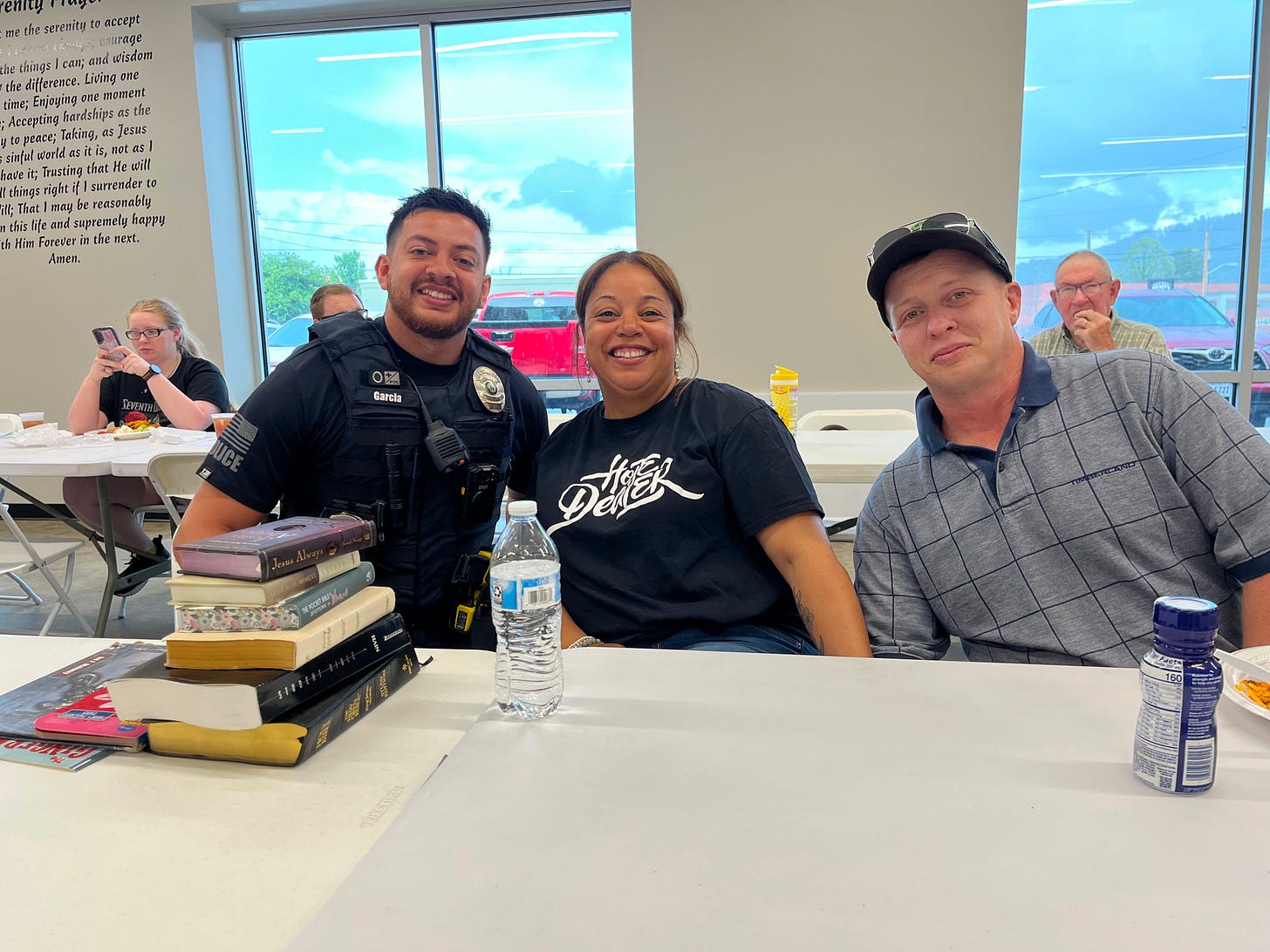
And, finally, Cooper eschewed the old drug-war mentality when he saw it wasn’t helping quell the sky-high overdose data, nor was it helping the women stuck in area motels and trap houses, where many were being sex-trafficked.
Diedra Cooke was one of them. She’d been using since the age of 11, spent a lot of time at Joe’s trap house, and recalled waking up in motels where men had paid to rape her. She was so amped up on methamphetamine at one point that she thought her own shadow was following her.
“What do you want from me?” she remembers asking Kisha the first time a friend brought her in for a meal. She was used to everyone wanting something from her and couldn’t work out why these strangers were being so nice.
“People always said that I was the worst of the worst,” Diedra said.
And every time, Nene responded, “That’s OK; they said that about Jesus, too.”
Kisha took her into their home and told her, “You teach us about addiction, and we’ll teach you about Jesus.” While some drug users are put off by their religious bent, the family emphasizes that you don’t have to believe to belong. One of their meal regulars is a Wiccan, “and nobody says anything,” Kisha says. “They know we’re cool with it.”
It’s that harm-reduction approach — the nonjudgmental back-and-forth — that makes God’s Storehouse the kind of place where you’re as likely to run into a city official or retired teacher manning the food line as you are a trap house operator.
The one currently operating Joe’s old shack on the hill, named John, told me as much at a recent supper. “I’ve been coming here for four years,” he said. “I still drink but not as bad. I’m planning on getting in a program soon.”
Today, for instance, he said he’d only had two beers for breakfast and two for lunch – when he used to consume as many as 24 by suppertime.
When Kisha pointed out the fact that it had also been many months since he’d last gone to jail, they high-fived each other. She thought John had the potential to become a Hope Dealer, one of her 26 recovery leaders. To join, participants have to attend four consecutive Celebrate Recovery meetings, do community outreach, and pay $25 dollars for the T-shirt.
“If they do crazy stuff, we take the shirt back!” she said. She laughed when she said it, but it was true: keeping up with people, even when they screw up, was what had made the biggest impact.
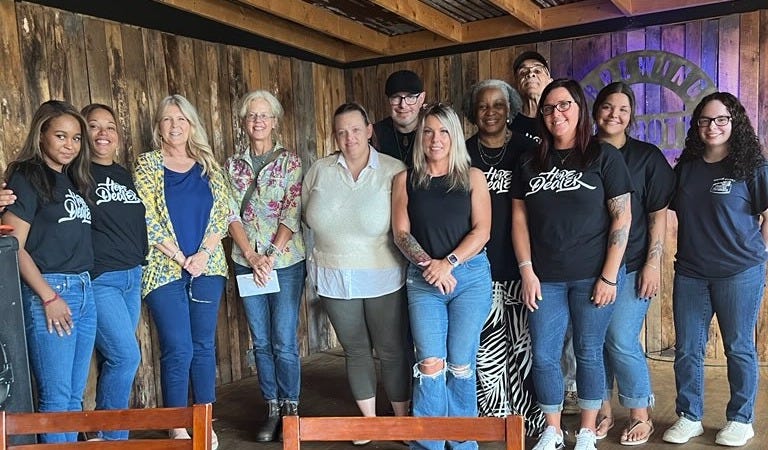
.
As Galax vice mayor Beth White, who is also the soup kitchen’s chaplain, put it, “Kisha and her family, they were just a regular family, not involved in poverty or food insecurity before. They started, really, just doing the next right thing.” Nene was a retired C.N.A. while Bill, a veteran, had been a long-haul truck driver. Kisha, a divorced mom who only recently began taking a $30,000 annual salary to run the place, used to work at the Virginia Employment Commission.
In this fractured moment of food insecurity and cataclysmic cuts, I thought we all deserved a glimpse into one family’s neck hair-raising brand of grace—a place that could be easily replicated if more people emulated this family’s brand of good will. For more information or to make a donation, see godsstorehousegalax.com.
• • •
WHAT I’M CONSUMING and RIP THE STINKIEST DOG
• After mainlining news since the beginning of Trump 2.0—unable to even pick up a novel—it was an old Maggie O’Farrell book, Instructions for a Heatwave, that finally broke the spell. (If you haven’t yet read her Hamnet, walk don’t run to your nearest indie bookshop.) I’ve since ordered her entire backlist. In the past week I’ve also devoured Jennifer Wiener’s riveting novel of addiction, All Fall Down, and the ethereal, magisterial North Woods by Daniel Mason.
• I’m full of gratitude for all our dog-loving friends and neighbors. Up at our cabin in Craig County, next-door neighbor Mary Jane gave our wire-haired terrorist rescue mutt, Mavis, the last breakfast she ended up enjoying—a bowl full of crispy bacon. At home, neighbors Scott, Jean, Lee, and Nancy seemed as choked up about her death as we were. Our vet, Dr. Sara Farthing, did all she could for our girl in her final months. Our youngest, Sasha, and their partner, Mina, drove three hours to be with us as our vet administered the last shots on our sunroom floor.
It’s been almost a week since Mavis died, and Tom and I still keep thinking we are glimpsing her—in a laundry pile on the floor, in the backyard bush where she used to scritch around self-administering back scratches, in the half-eaten tiny zinnia seedlings that were her favorite springtime fare. She was irascible and stinky, and at her happiest, she would give you a “paw,” by which I mean she stretched out her spindly arm and pushed hard on your chest and just held it there, and you were never quite sure whether she was loving you or pushing you away.
I’m pretty sure she was mostly loving us. I hope she’s up there chasing deer and bears on heaven’s Mill Mountain and devouring platters of zinnia-sprinkled bacon. RIP, sweet stinky girl.



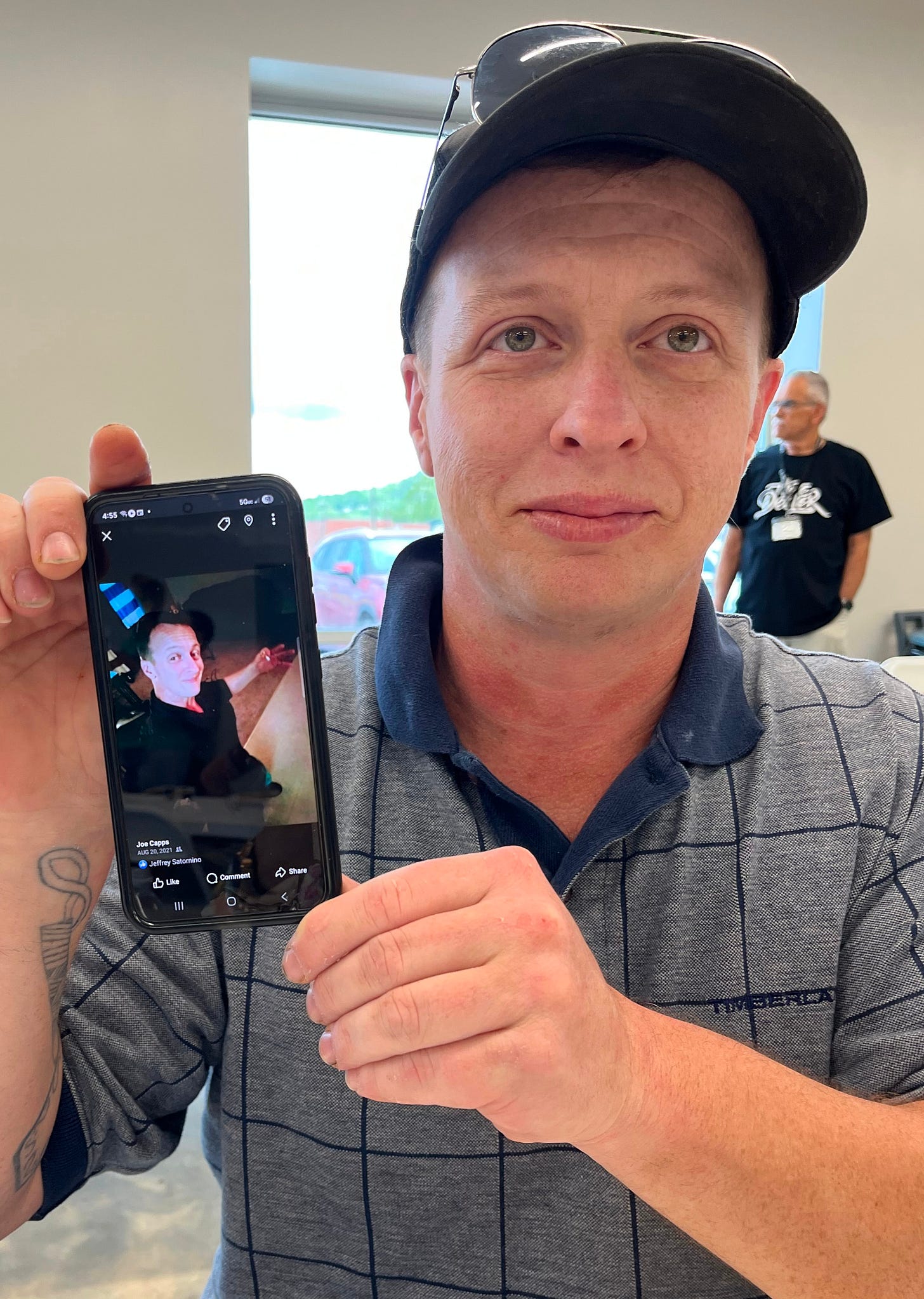

This is beautiful and remarkable. Grassroots change is the longest lasting.
I am sorry for your loss of Mavis. What a beauty.
Thanks, Beth, for telling us about more really good people in these turbulent times. I am smiling and tearing up over thoughts of Mavis.